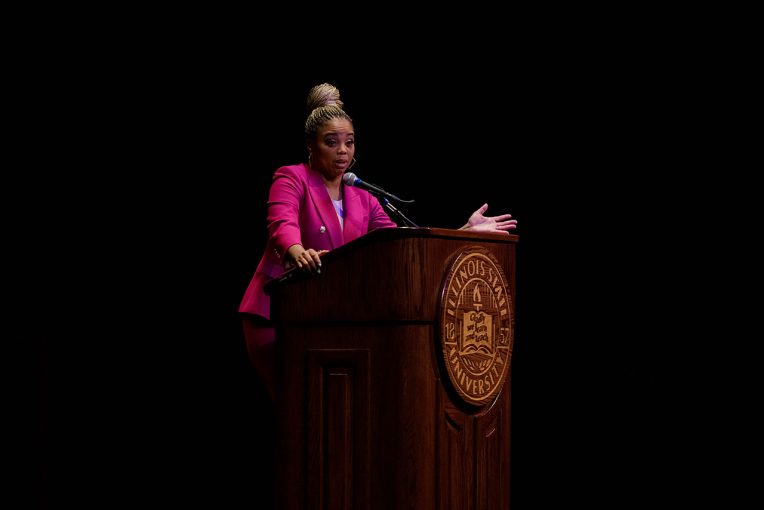Jemele Hill didn’t come to Illinois State University February 25 to focus on her career as an Emmy Award-winning journalist, her founding of Lodge Freeway Media, her writing for The Atlantic, her podcasting, or how she was once the only Black female sports columnist at a daily newspaper in North America.
Instead, Hill’s message for the estimated crowd of 300 people at Illinois State’s sold-out Martin Luther King Jr. Cultural Dinner centered on persistence and resistance. She mentioned how the conversation about race and social justice in America after George Floyd’s murder by police has given way to a backlash against teaching America’s full history in the classroom under the guise of attacking critical race theory, the banning of books, and the push for laws targeting the LGBTQ+ community.
“You all know that every time that there has been the hint of progress it has been met with intense backlash. It has been stunningly severe at every moment. Reconstruction brought us Jim Crow. The Civil Rights and Voting Rights Acts brought the Southern strategy, the War on Drugs, and mass incarceration. A Black president brought Donald Trump. A whisper of a racial remedy two years ago has brought the moment that we’re in right now. And so I wonder how will we stand at this time. How will we prove that we actually have the guts to take a different course?”
Hill issued this challenge multiple times during her keynote speech and a follow-up Q&A session moderated by Dr. Doris Houston, interim assistant to the president for Diversity and Inclusion, and was met with applause from the audience in the Brown Ballroom of the Bone Student Center. Earlier in the day, Hill participated in a discussion with students, faculty, and staff through the On Common Ground program facilitated by Angell Howard ’10, MSW ’13, associate director for Professional Development and Staff Recognition in the Division of Student Affairs.
Illinois State’s second cultural dinner of the school year had been postponed from its original January 21 date due to the coronavirus (COVID-19) pandemic. During Hill’s introduction, President Dr. Terri Goss Kinzy thanked Hill for her flexibility in rescheduling her appearance but noted how appropriate it was to hear from the trailblazing broadcaster during Black History Month. “It’s also incredibly fitting that tonight we hear from Jemele Hill, whose writing, podcast, commentary, and future endeavors fused the world of sports with the world around us.”
That fusion of sports and the outside world collided for Hill in 2017. She was working for sports media giant ESPN when she tweeted that U.S. President Donald Trump was a white supremacist. That led to calls from the White House for her to be fired.
“Those are just the small details of what has been an amazing life for me. But as I stand here before you today what I really want to talk about is how we’re going to resist in this moment and stand against all the nonsense that’s happening in this moment right now.”
Hill spoke about how Dr. Martin Luther King Jr. said the real hindrance to freedom for Black people wasn’t the Ku Klux Klan or other overtly racist groups in the United States, but the white political moderate who cared more about so-called order than justice. She highlighted the NFL, which is being sued by a Black coach for racial discrimination two decades after the league pledged to make changes following a similar legal threat. “This is about a league using performative gestures over and over again to try to absolve themselves from what is a systemic racial problem.”
Hill concluded her speech with a challenge for the audience. “We have young people in this room who are watching what we’re doing or not doing, and they’re taking their cues from us. So what are we willing to do to change history? It doesn’t have to be as momentous as Colin Kaepernick taking a knee or being the first black woman to be a Supreme Court justice. It’s the little moments that matter. It’s the mentorships, the allyships, the co-conspiratorships that matter in this moment.”
Houston thanked Hill for her speech and for speaking truth at the event. “More importantly, thank you for challenging us to act and continue to carry on Dr. King’s legacy after we leave this room.”
During the Q&A that followed her speech, Hill explained how marginalized peoples need co-conspirators, not just allies. “Everybody has a responsibility to bring something with them to this conversation and forcing or putting whether it be Black students, Latino students, LGBTQ+ students in the position where they have to hold your hand and teach you everything is another level of trauma that they shouldn’t have to experience. The people who are most oppressed by the systemic problems in our society shouldn’t also be forced to solve the problems.”
The Martin Luther King Jr. Cultural Dinner was presented by the Office of the President, University Housing Services, the Division of Student Affairs, and the Association of Residence Halls. The Asian Cultural Dinner featuring Pulitzer Prize-Winning journalist, acclaimed filmmaker, and immigration advocate Jose Antonio Vargas is scheduled for April 12 in the Brown Ballroom of the Bone Student Center.


